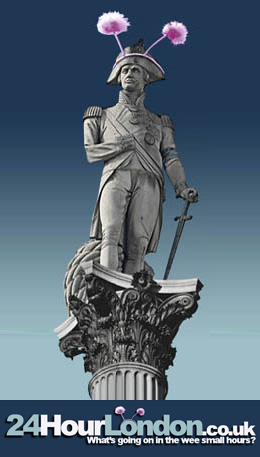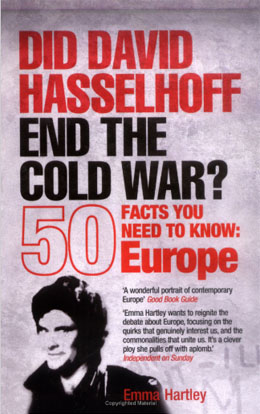If you'd like to read this liveblog in chronological order, you should begin at the bottom.
The lady from David Marsh's publishing house turned to me at the end and said "Wasn't that interesting? I thought there was going to be a bit of a lynch mob for NMG at the beginning but actually the audience seemed very much on his side by the end."
Yes, I replied. But then you have to ask yourself what kind of people are motivated to come out to a debate on grammar in the first place...
Anyway. This is has been fun. Hope you enjoyed it too. Keep those apostrophes flying and please feel free to leave comments underneath this blog. Good night.
8.18
An audience member - another teacher - references Stephen Fry being a grammar snob at the Baftas last night. He learnt the rules at a good school, so he can break them. The teacher gets a round of applause for saying that, on the other hand, many of his students are completely unable to express themselves and that this is tragic. I'm not sure, if I were him, that I would have exposed my own school's teaching like that...
8.16
NMG gets the only round of applause of the evening so far by making a point about declining standards. Interesting.
8.16
An audience member takes on NMG about his pronunciation of "off", which is "orf". You're a prescriptivist, he asks. Should we all pronounce it like that? Does anyone else in this room pronounce it like that?
8.15
NMG blames Merriam Webster, the dictionary man, for America's "irrational" spelling, which he ascribes to wishing to differentiate themselves from the English after the revolution for political reasons.
8.12
DM. In some ways American is more traditional than English English. For instance the word "gotten", which used to be used in England and is no longer. Apparently there is someone in the audience who runs a website called Divided by a Common Language, and this is their specialist subject. (If anyone has a link for that website, please email me.)
8.10
More audience questions. These are good.
An OECD survey has shown that Britain is the only country in the world where children have a lower level of literacy than their parents. Why is that?
NMG, an audience member asks, you keep saying that grammar was abolished in the 1960s. Surely that was for a good reason?
Do animals not think because they don't know any grammar, asks another? That one's for NMG.
Is American English a different language entirely or are they just illiterate?
An audience member points out that Sylvia Plath committed suicide and she was a dab hand at grammar. (I love this audience.)
Over to you panel...
8.05
An English teacher from the West Midlands says that grammar is taught in a dull way. She has students who can critically analyse but can't write a coherent sentence. Should grammar be taught explicitly? Or through osmosis?
NMG says that everyone keeps saying grammar is dull. "I don't care about that" he says. The important thing is to have an adult who can express themselves correctly.
8pm
Disagreement. NMG believes that there was a time when nearly everyone knew their grammar. David Marsh disputes this.
7.58
DM is sticking up for text speak. OMG is not new, he says. What do you think RIP is?
I'm not trying to be the trendy uncle, he says. But all of us who use social media are using language skills in a sophisticated way all the time, which you apparently deny.
NMG recites a list of good writers and top intellects, including Rudyard Kipling - which produces a sucking in of breath from the audience. The list has no women on it.
7.54
Questions from the audience now.
"I was not blessed with Britishness at birth," says an audience member with an - Italian? - accent. Would you agree with the idea that language changes and evolves, she asks? Because originally - several centuries ago - my mother tongue was Latin and it has simply evolved.
Yes. It does evolve, says NMG. But at some point it also became fixed. English, for instance, was passed down many generations in tact... until the 1960s.
There's definitely a theme emerging here.
7.52
Maybe, suggests Matthew Reisz, we could stick to grammar and not branch out into the decline of the western world?
Ha!
7.48
So, asks DM, was the decision to invade Suez a better decision than the decision to invade Iraq? Or were they both really stupid decisions?
It's getting warmer in here.
7.45
DM: If proper grammar forms people's minds and correct education was abolished in the 1960s why do we have so many extremely bright youngsters? People are much better at communicating generally now than when I was young, says DM. And greengrocers have never known how to use apostrophes.
NMG: I've got sets of exam papers from 50 years ago. Arithmetic papers taken by 11-year-olds in the 1920s. And another set by teacher training college graduates in the 1970s. There is no comparison, he says. Examination standards have collapsed.
15 to 20 per cent of people can't read and write at all, NMG says. It's had an effect on the standard of thinking in society. When I was young there was no such thing as suicide, he adds. Uh-oh. I think he's lost the audience there...
7.43
DM is taking on NMG's central argument, arguing that thinking predates language. "My wife speaks four languages. Which one does she think in?" he asks. He's citing Pinker.
7.40
NMG: David Marsh is a lovely person. I'm sure his mother loves him, anyway. But the way he uses hopefully should instead be "hopedly".
Oh, and NMG is exercised about the demolition of the eduction system that began in the 1960s.
7.30
And what doesn't David Marsh like about NMG's book?
We-ell. Nevile's book is terrific on the difference between restrictive and non-restrictive relative clauses, but....
Strunk is a strange choice of style guide to follow. If one were talking to a bunch of teenage girls about grammar and the first thing you showed them was a book that uses "girls mincing around" as an example - which Strunk does - it's going to look very dated.
In fact Nevile's approach is extremely dated, says DM. Who uses "per caput" instead of per capita?
DM dislikes NMG on split infinitives. How do sticklers got so hung up on this, he asks?
What's the obsession with "hopefully"? Sadly I got up from the sofa, says DM. But Nevile was still droning on about hopefully.
I'm a real stickler for punctuation, says DM. I'm not some young iconoclast and my job is getting Guardian journalists to do what they're told. It's like herding cats.
STOP PRESS: David Marsh founded
International Apostrophe Day.
7.25
NMG: My biggest problem with David Marsh's book is with his use of "hopefully".
"I think his position is illiterate. The word 'hopeful' can't mean what he wants it to mean." Oo-er.
7.22
"What was the question I was going to answer?" asks NMG.
"Is there anything about my book you like?" replies DM.
NMG: "It's a very good book... But when your next edition comes out David, as a result of what you have learned from me, it will be a very great book."
7.20
When I was young everybody knew their parts of speech by heart, replies NMG. The fact that that is no longer true has introduced class distinctions, he argues.
7.15
David Marsh kicks off with an anecdote about Nando's. "Was there a Nando?" he asks.
The he moves on to "Even grammar, the basis of all eduction, baffles the brains of the younger generation. Not a single modern schoolboy... can read a Latin author or read a modern language," which apparently is a quote from Piers Plowman in 1332.
"If I ask most journalists to define the two main types of reflexive pronoun they couldn't. I don't think people ever could. It's really rather dull. I'm not sure that getting them to learn things off by heart would be the right approach. I wrote my book because grammar can be fun."
7.10
NMG sets out his stall, which runs roughly thus. Without words we cannot even think. Vocab is about what words mean. The more we know the more competent our thinking will be . Grammar is how you put words together in order to have your thoughts. The more exact your grammar the better your thinking will be and therefore the better your decision-making will be.
He says: "I argue that ultimately civilisation depends on grammar. This is what everyone has always thought." He namechecks Eton and Winchester because they began as
grammar schools.
Grammar is a fixed science, he says. Sure, words are added here and there. But if I were to pick up a grammar book written in the 1820s it would serve perfectly well today. Shakespeare did not split infinitives and nor would I recommend you to.
The big difference between Mr Marsh and myself, says NMG, is that I believe you have to fight change because change is destabilising.
7.07
Well, that was odd. NMG came on stage, received a round of applause and then departed again. Back shortly afterwards. Both speakers are now safely installed on the sofa. David Marsh got the slightly warmer applause but I guess Kings Place is Guardian territory.
7.05
Matthew Reisz's name is pronounced Rice, in case there were any doubt.
There's a story from writer Tim Lott, says Reisz, about how he couldn't help noticing the misplaced apostrophe in his mother's suicide note. A portent of things to come?
7pm
Geraldine D'Amico, curator of the Kings Place Words on Monday series introducing... She observes that grammar attracts a larger audience than saving the rainforest. It's the one thing that the English can be relied upon to argue about apparently. She's French.
6.59
Aha!
6.50
The audience is arriving. Apparently about 140 tickets have been sold, which seems not bad for a Monday night's debating about grammar.
It may interest you to know that one of the last occupants of Hall One's stage, on Friday evening for one of his sequence of surprise London gigs, was Prince. The Purple One. Not The Tweedy One. The evening was notable, even for those of us who didn't want to shell out £70 for a ticket, for the Twitter meme that shot up as soon as the gig became public knowledge, with the hashtag #guardianprincesongs My favourite was Nothing Compares Tofu...
That reminds me: no sign of our Tweeter so far.
6.45
There was something ever so slightly jets and sharks about the banter backstage. "We need to talk about how much is too much," said NMG to DM with the air of one angling for a psychological advantage. "I'd like us to still be friends at the end," he added, implying that he felt it was by no means a foregone conclusion.
Prescriptivists vs descriptivists, eh? Cuh.
6.30pm
Well, the wifi works. That's good.
And all the speakers are here in good time - even NMG, who has come all the way from Northern Ireland.
Here's a slightly rubbish picture of David Marsh (left), our moderator Matthew Reisz (centre) and NM Gwynne. Proof of life at least and the green room lives up to its name.
Monday 17 February 12.30pm
A technical note: in order for this to work as a live blog, you will have to refresh the page every once in a while, otherwise it'll just be a snapshot of the evening at a given point in time.
And here is a brief introduction to our two contenders...
In the blue corner is NM Gwynne. You can get a sense of who he is by following these links.
This evening's debate will be tweeted by Chie Elliot of Carlton books, whose Twitter handle is
@OrangeBlossomer and she will be using the hashtag #KPgrammar
I will be liveblogging a debate on grammar between David Marsh, the Guardian's style guide editor, and Nevile Martin Gwynne, author of Gwynne's Grammar, at Kings Place in King's Cross, from 7pm on Monday 17 February on this page.
You can buy tickets to the event itself
here. Otherwise I hope you can join me online. You can also tweet along using the hashtag #KPgrammar
In the mean time, questions and grammatical pedantry arising from the debate or from the books written by either of these experts can be sent to me at
emma.hartley.casual@guardian.co.uk
David Marsh's book, For Who the Bell Tolls, can be had
here. And NM Gwynne's book can be purchased
here.
Obviously writing a liveblog about grammar is like introducing an IED to one's living room and all resulting critique will be taken in good part. Bring it.














